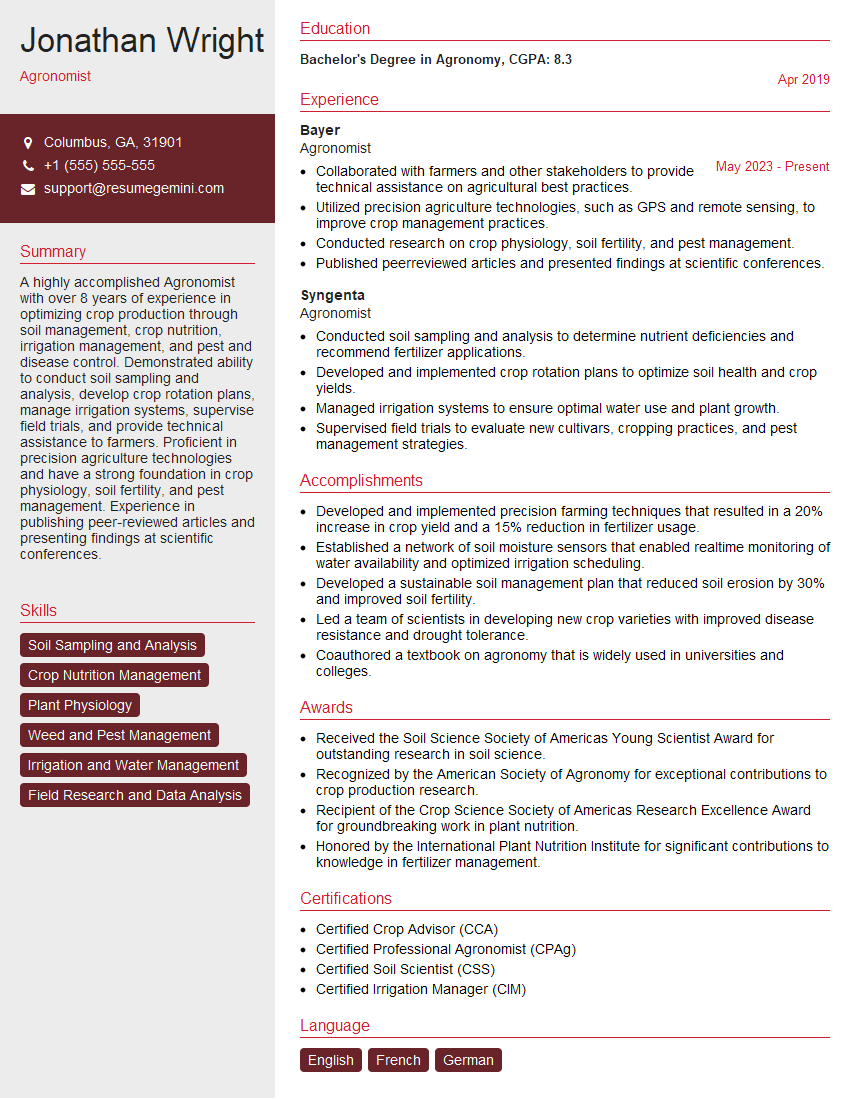Are you a seasoned Agronomist seeking a new career path? Discover our professionally built Agronomist Resume Template. This time-saving tool provides a solid foundation for your job search. Simply click “Edit Resume” to customize it with your unique experiences and achievements. Customize fonts and colors to match your personal style and increase your chances of landing your dream job. Explore more Resume Templates for additional options.

Jonathan Wright
Agronomist
Summary
A highly accomplished Agronomist with over 8 years of experience in optimizing crop production through soil management, crop nutrition, irrigation management, and pest and disease control. Demonstrated ability to conduct soil sampling and analysis, develop crop rotation plans, manage irrigation systems, supervise field trials, and provide technical assistance to farmers. Proficient in precision agriculture technologies and have a strong foundation in crop physiology, soil fertility, and pest management. Experience in publishing peer-reviewed articles and presenting findings at scientific conferences.
Education
Bachelor’s Degree in Agronomy
April 2019
Skills
- Soil Sampling and Analysis
- Crop Nutrition Management
- Plant Physiology
- Weed and Pest Management
- Irrigation and Water Management
- Field Research and Data Analysis
Work Experience
Agronomist
- Collaborated with farmers and other stakeholders to provide technical assistance on agricultural best practices.
- Utilized precision agriculture technologies, such as GPS and remote sensing, to improve crop management practices.
- Conducted research on crop physiology, soil fertility, and pest management.
- Published peerreviewed articles and presented findings at scientific conferences.
Agronomist
- Conducted soil sampling and analysis to determine nutrient deficiencies and recommend fertilizer applications.
- Developed and implemented crop rotation plans to optimize soil health and crop yields.
- Managed irrigation systems to ensure optimal water use and plant growth.
- Supervised field trials to evaluate new cultivars, cropping practices, and pest management strategies.
Accomplishments
- Developed and implemented precision farming techniques that resulted in a 20% increase in crop yield and a 15% reduction in fertilizer usage.
- Established a network of soil moisture sensors that enabled realtime monitoring of water availability and optimized irrigation scheduling.
- Developed a sustainable soil management plan that reduced soil erosion by 30% and improved soil fertility.
- Led a team of scientists in developing new crop varieties with improved disease resistance and drought tolerance.
- Coauthored a textbook on agronomy that is widely used in universities and colleges.
Awards
- Received the Soil Science Society of Americas Young Scientist Award for outstanding research in soil science.
- Recognized by the American Society of Agronomy for exceptional contributions to crop production research.
- Recipient of the Crop Science Society of Americas Research Excellence Award for groundbreaking work in plant nutrition.
- Honored by the International Plant Nutrition Institute for significant contributions to knowledge in fertilizer management.
Certificates
- Certified Crop Advisor (CCA)
- Certified Professional Agronomist (CPAg)
- Certified Soil Scientist (CSS)
- Certified Irrigation Manager (CIM)
Career Expert Tips:
- Select the ideal resume template to showcase your professional experience effectively.
- Master the art of resume writing to highlight your unique qualifications and achievements.
- Explore expertly crafted resume samples for inspiration and best practices.
- Build your best resume for free this new year with ResumeGemini. Enjoy exclusive discounts on ATS optimized resume templates.
How To Write Resume For Agronomist
- Highlight your experience in soil sampling and analysis, as it is a critical aspect of agronomy.
- Quantify your achievements whenever possible, using specific numbers and metrics.
- Showcase your knowledge of crop nutrition management and its impact on crop yields.
- Emphasize your expertise in irrigation management and your ability to optimize water use efficiency.
Essential Experience Highlights for a Strong Agronomist Resume
- Conducted soil sampling and analysis to determine nutrient deficiencies and recommend fertilizer applications.
- Developed and implemented crop rotation plans to optimize soil health and crop yields.
- Managed irrigation systems to ensure optimal water use and plant growth.
- Supervised field trials to evaluate new cultivars, cropping practices, and pest management strategies.
- Collaborated with farmers and other stakeholders to provide technical assistance on agricultural best practices.
- Utilized precision agriculture technologies, such as GPS and remote sensing, to improve crop management practices.
- Conducted research on crop physiology, soil fertility, and pest management.
Frequently Asked Questions (FAQ’s) For Agronomist
What are the key responsibilities of an Agronomist?
Agronomists are responsible for studying soil, crops, and the environment to improve agricultural practices. They conduct soil and plant tissue analysis, develop and implement crop management plans, and advise farmers on best practices for crop production.
What are the qualifications to become an Agronomist?
A Bachelor’s Degree in Agronomy or a related field is typically required. Coursework in soil science, plant science, crop production, and agricultural economics is common.
What are the job prospects for Agronomists?
The job outlook for Agronomists is expected to grow faster than average in the coming years. This is due to the increasing global population and the need for sustainable?? practices.
What are the earning potential for Agronomists?
The salary for Agronomists can vary depending on experience, location, and employer. According to the U.S. Bureau of Labor Statistics, the median annual salary for Agronomists was $63,980 in May 2021.
What are the challenges faced by Agronomists?
Agronomists face challenges such as climate change, pests and diseases, and the need to produce more food with fewer resources.
What are the career advancement opportunities for Agronomists?
Agronomists can advance their careers by pursuing higher education, taking on leadership roles, and specializing in a particular area of agronomy.